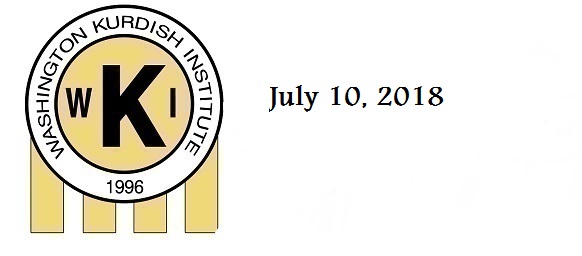981
Iran
- On July 7, a Peshmerga group linked to The Democratic Party of Iranian Kurdistan (KDP-I) clashed with the Islamic Revolutionary Guard Corps (IRGC) in Koke village near Bokan city. According to a statement by the KDP-I, the Peshmerga group “ did not sustain any casualties.” The KDP-I in Iran have increased its operations against the regime in light of the government’s human rights abuses against the country’s Kurds and as the economy continues to stagnate. Earlier this month, Mustafa Hijri, the leader of the KDP-I said in a statement that “[t]he presence of the Peshmerga in Iranian Kurdistan has increased recently and they appear among the people more frequently,” indicating rising armed opposition against the regime.
- Iranian intelligence agents shut down a Kurdish cultural festival and arrested five of its organizers on Thursday. The festival, which initially had legal permission from the government, was to have 450 Kurdish writers, poets, musicians, linguists and cultural activists.
Iraq
- Several Kurdish parties including the Change party (Gorran), the Kurdistan Islamic Union (KIU), the Islamic Group (Komal), and the Coalition for Democracy and Justice (CDJ). The same Kurdish political parties that rejected the May 12th election results will boycott the recount unless all ballots are recounted, not just those from polling places that face fraud allegations. After the manual recount in Kirkuk the Patriotic Union of Kurdistan (PUK) claimed that although their number of votes increased in the recount, they retained the same number of seats. Others claim that their number of votes decreased with the manual count, especially in areas with high Arab or Turkman populations.
- Due to the lack of basic services in Kirkuk, tens of people protested the lack of electricity in the province. This lack of electricity has been particularly brutal as temperatures have been extremely high in recent days. The protesters demanded that the local administrator restore Kirkuk’s share of electricity prior to October 16, 2017 when Iraqi security forces and militias controlled the province. Meanwhile the security situation in Kirkuk continues to deteriorate as the Islamic State (ISIS) has activated a sleeper cell in Kirkuk Province. Three people died in a bomb blast Saturday, following a string of kidnappings, killings, and random attacks on civilians in the past month.
- In continuation of their military campaign inside Iraqi Kurdistan, the Turkish forces bombarded Duhok with airstrikes, displacing villagers, setting fire to crops, and ruining animal feed. The mountainous region was suspected to be a position held by the Kurdistan Workers’ Party (PKK.)
Syria
- After several reports from the pro-Syrian regime news source Al-Masdar claiming to have finalized an arrangement with the U.S.-backed Syrian Democratic Forces (SDF), leaders of the SDF claimed these articles were being used to create division and uncertainty between the US and its primary ally in the country. In response to this, Salih Muslim, the prominent Syrian-Kurdish politician and former Co-chair of the Democratic Union Party (PYD) tweeted a statement on July 9th condemning the Assad regime’s “false leaks” of information on agreements betweens the regime and the SDF. Muslim stated that the “lack of seriousness” of the Syrian government demonstrates an “unwillingness to reach a solution.”
- The SDF general command issued a statement announcing that 31 villages and sub-districts have been liberated from ISIS in the East of Syria between June 24th and July 5th. This announcement comes as Operation Jazeera Storm (sometimes known as Cizire Storm) draws to a close in Hasakah Governorate, after having successfully pushed ISIS out of one of their last remaining pockets of influence.
- Fighting has broken out between Turkish-backed ‘Free Syrian Army’ groups complicit in the occupation of Afrin, killing at least 1 and injuring 10. Afrin has been in Turkish hands since March 18th, when an over 2-month siege orchestrated by the Turkish army forced the Syrian Democratic Forces (SDF) to retreat. Interfactional violence has become commonplace in Afrin, with civilians taking the brunt of the damage. The UN High Commissioner for Human Rights issued a report stating that the Turkish authorities are “currently unable or failing to act to ensure public order and safety” in Afrin, a situation which has been exacerbated by the Turkish-approved arrival of other FSA groups such as Failaq ar-Rahman and Jaysh al-Islam.
Turkey
- According to the interior ministry between July 2nd and 6th, the Turkish military conducted almost 2,000 separate operations against the PKK in Southeastern Turkey resulting in the death of 25 PKK fighters. These attacks on the PKK were backed by airstrikes, according to Turkish security forces These operations occurred at the same time as Turkey’s ongoing military action in the Kurdistan Region of Iraq and the Qandil Mountain Range.
- On July 9th, Recep Erdogan was sworn in as a president of Turkey after winning 52% of the vote in the June elections. The new presidential position absorbs the full power of the executive, having removed the office of prime minister. The centralized position gives Erdogan sweeping authority over matters of state and society, which he has already begun using to restructure the ministries of his government.
- Following its loss in the recent Turkish elections, the People’s Alliance, a coalition of three opposition political parties, has announced its dissolution, according to a joint-statement by the two smaller partners. The Alliance was the project of the Republican People’s Party (CHP) in conjunction with the centrist Iyi ‘Good’ Party and the Islamist Felicity Party. According to Iyi spokesman Aytun Ciray the alliance was not meant to be a continuing coalition, rather it was strictly “electoral cooperation.” The pro-Kurdish People’s Democratic Party (HDP) was not affiliated with the People’s Alliance, but has vowed to continue the “struggle for justice and equality” in Turkey post-election.

